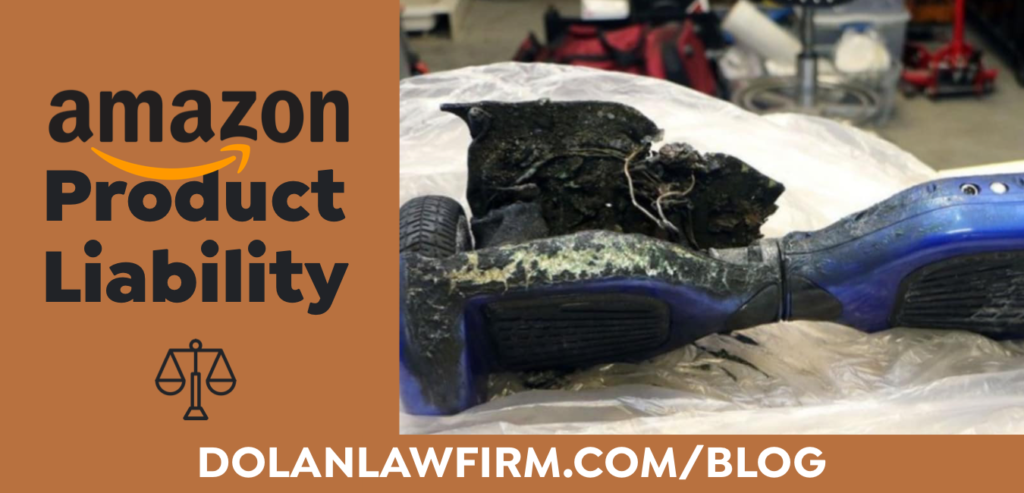Written By: Christopher B. Dolan
This week I will discuss an important case I’m working on seeking to hold one of the world’s largest, most powerful corporations responsible for injuries caused by products they sell to consumers: Amazon.
As we have seen in our communities, what online shopping had not yet brought down, the pandemic dealt a death blow. There to fill the vacuum, as both sinner and savior, was Amazon — keeping goods flowing while getting us all hooked on the dopamine fueled search for bargains and next day delivery.
I studied economics and business in my undergraduate and master’s degrees before studying law. There I learned about the multiplier effect: an initial injection into the economy causing a bigger overall increase in national income. The idea is if the government injects, say for example, 1 trillion dollars into the economy, this will lead to a 1.2 trillion dollar increase in national income. People will have more money to spend (whether through unemployment or by their employers re-opening/staying afloat) and demand for goods will go up, leading to more people being hired and more money being spent on things like transportation of goods, retail rents, clothes, furniture, phones, cars, Starbucks, etc. and the cycle repeats.
Amazon is causing the liquefaction of the foundations of the retail economy with retail workers, transportation workers, parking attendants, janitors, and every related service falling into an abyss. (Think Kmart, Sears, JCPenney, Toys “R” Us.) Money previously injected into local economies is now mainlined into the corporate juggernaut, Amazon, in Seattle. Sure, it creates some jobs but the direct shipment from manufacturers to customer’s results in a net loss of jobs. The money going to Amazon, because of automation and direct shipping, leads to a much lower multiplier effect. The money goes to higher salaries for management and inestimable wealth for Jeff Bezos. How many cups of coffee, cars, planes, clothes and haircuts can one man have? So that money doesn’t multiply through the workforce as before, it consolidates into the ever more exclusive 1% of the 1%.
So what does this have to do with me? I took a case of first impression, not based on its size or value, but based on its potential to protect hundreds of millions of consumers and change the law forever — a case involving a defective hoverboard, purchased on Amazon, which burst into flames on December 31, 2015, burning my client and her home. The cause of the fire was defective lithium-ion batteries. The Chinese manufacturer went out of business as did the U.S distributor. The only one left in the chain of distribution was Amazon. I brought suit on behalf of my client based on a body of law known as “strict product liability,” which holds anyone in the chain of distribution, from manufacturer through the retailer, liable for the injuries caused by dangerous products. The rationale is that they are profiting from the sale, and are in a better position than a consumer to bear or pass along the costs associated with defective products through the purchasing insurance, or increasing the cost of each product a few cents. This is preferable than an individual consumer bearing all of the costs associated with a defective product. In catastrophic cases when a consumer has no health insurance or savings we, the taxpayers, often pay for their medical care and, through Social Security or other programs, their food, clothing and shelter. We end up subsidizing the sale of defective products.
Amazon contends that it is not in the chain of distribution, it just is an electronic platform where buyers and sellers interact with each other, they don’t “sell anything” and, therefore, they should not be held liable for the damages caused by defective products sold through Amazon. I was able to depose Amazon executives and obtain internal corporate documents that showed they charge a listing fee, control the listing content, get a flat fee per-unit-sold, collect the money, process rebates and refunds under their A-Z guarantee, and in the case of the hoverboard, take a 15% cut of the total sale. A trial court sided with Amazon saying that they couldn’t be held liable as a seller and I appealed.
My argument is that they are instrumental in the products being chosen, purchased and delivered, while making a substantial profit. It makes no sense to say that Amazon shouldn’t have the same legal obligation as the very brick-and-mortar stores that Amazon put out of business. Amazon is the 21st century retailer. Their market dominance allows them to put pressure on the manufacturers to make safe products and buy insurance. Strict liability would incentivize Amazon to stop selling dangerous products and purchase insurance with some of their profit so the innocent and unsuspecting consumer (their customer) isn’t left devastated and destitute.
I expect a ruling from the Court of Appeals in the next month. Keep your fingers crossed that the law will, once again, work to equalize the balance of power and hold Corporate America accountable.









